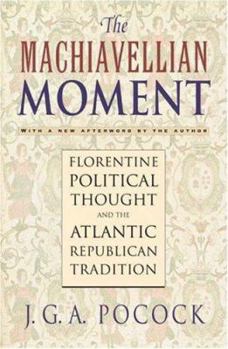The Machiavellian Moment: Florentine Political Thought and the Atlantic Republican Tradition
Select Format
Select Condition 
Book Overview
The Machiavellian Moment is a classic study of the consequences for modern historical and social consciousness of the ideal of the classical republic revived by Machiavelli and other thinkers of Renaissance Italy. J.G.A. Pocock suggests that Machiavelli's prime emphasis was on the moment in which the republic confronts the problem of its own instability in time, and which he calls the "Machiavellian moment." After examining this problem in the thought...
Format:Paperback
Language:English
ISBN:0691114722
ISBN13:9780691114729
Release Date:February 2003
Publisher:Princeton University Press
Length:640 Pages
Weight:2.00 lbs.
Dimensions:1.4" x 6.0" x 9.3"
Customer Reviews
3 ratings
Brilliant
Published by Thriftbooks.com User , 18 years ago
This is a remarkable, though not easy to digest, book. Pocock traces the development of modern republican political theory from its birth in Renaissance Florence to the end of the 18th century. This book incorporates both broad structural analysis of the the unfolding of this tradition and a detailed readings of the major and quite a few minor contributors to this tradition. Pocock starts out by demonstrating that the Christian-Medieval tradition of western Europe was not equipped with the conceptual apparatus to develop a theory of republican governance. Intellectuals in Renaissance Florence then had to look back to the Classical writings of Aristotle, the historian Polybius, and other classical writers, to develop a system of thought that could justify and guide the life of city-states in Italy. An underlying theme that Pocock stresses throughout the book is the struggle of intellectuals trying to develop systems of government that would produce fulfillment and stability but constantly confronted with the insecurity and unstable nature of the real world. Another recurrent theme is the pressure to articulate republican theory constantly being confronted with new circumstances. The development of republican theory, particularly by the brilliant Machiavelli and Guicciardini, being prompted by the specific historical circumstances faced by the Florentine state. Machiavelli is really the pivotal figure, developing political theory unmoored from the divine. After tracing the development of Florentine theory, Pocock moves onto the development of republican theory in the very different circumstances of 17th century Britain. Here, theory had to accomodate not the problems of a city-state but an entire nation and changed significantly under the stimulus of the English Civil War. Pocock presents James Harrington as the key modifier and transmitter of the Machiavellian tradition and who in particular emphasized the role of property as the basis for republican stability. Pocock then moves on to the challenges of the 18th century with the confrontation of republican theory with an emerging commercial and imperial society. The final chapter deals with what happened when the American revolutionaries attempted to construct to a new society based on classical republican ideas. The failure of these ideas prompted the development of a new version of republican theory. Pocock's close analysis of individual thinkers is sometimes tough reading but ultimately rewarding. The analyses of individual thinkers are punctuated by general analyses that are invariably insightful and sometimes brilliant. Among other things, this is a basic book for understanding the intellectual background of the American Revolution and many important topics in modern history.
Birth and growth of the modern republic-- in a nutshell
Published by Thriftbooks.com User , 19 years ago
This is the best book that I have found to date that traces the development of the theory of the modern "res public" from Machiavelli and the Florentine city-state, to the Glorious revolution in 17th century England, to the foundation of the American republic. The Machiavellian moment comes when the founders of a state realize that "virtue" can be dependent upon "contingency" at some point in the life of every government, and that the res public is the best method known to humans to manage both to the benefit of the citizens/body politic; "virtue" refers to the energy that the humanist writers of the period demanded of any honest citizen, in the vita activa; contingency is the weakness that enters into any human-created activity, given the incomplete nature of our knowledge. This book is clearly written, and not difficult to digest if you come to it with some preliminary understanding, say, from quentin skinner's foundations of modern political thought. I am finishing richard tuck's philosophy and government 1572-1651 which purports to analyze the development of the period's political thought up to Hobbes' publication of Leviathan in 1651, but it just isn't as rich or satisfying a work as this. If you want to know why Machiavelli is so important, and understand his influence on the two greatest exemplars of republican thought since his time, this is without a doubt the book to read.
Well worth the time invested in reading!
Published by Thriftbooks.com User , 24 years ago
Pocock has written a profoundly exhaustive study of Florentine republican theory in the time of Machiavelli, the Republic, and the Medici restoration. He painstakingly makes his argument that the roots of Machiavelli's thought are to be found more in the metaphysical world view of Thomism than in the teleological taxonomy of Aristotle. He goes on to argue that the aim of Machiavelli, and contemporaries such as Guicciardini, is the attainment of stability in secular time through the proper extension of civic rights. He then goes on to claim that this aim is followed by the architects of Eighteenth Century Anglo-American republicanism. This strong intepretation of Anglo-American republicanism may understate the impact of, for example, the Miltonian view of individual capacity for moral and political reasoning. However, it certainly is expounded well enough here to hold its own in any debate. In passing, Pocock makes liberal use of untranslated Italian text. While this is useful to the Renaissance specialist, it would be helpful had he included translations for those of us who bring no Italian to the table.





